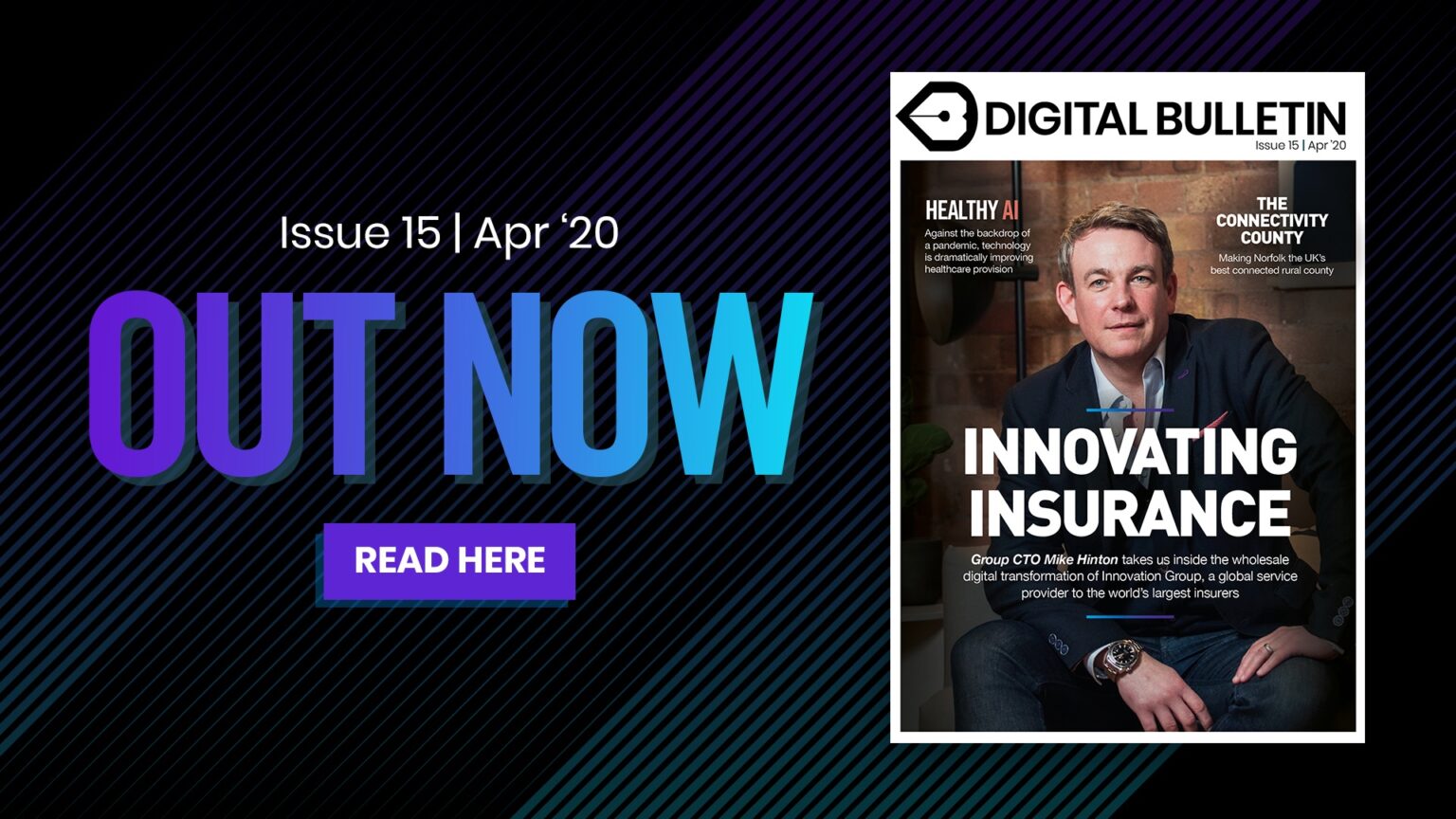
Last October, a crack team of data experts descended upon the headquarters of the United Nations. The reason? To hold a symposium on the future of data at the UN.
One of the panel members that day in New York City was Jordan Morrow. Some months later, Morrow agreed to speak to Digital Bulletin for an exclusive interview, in which he talked enthusiastically about how a self-labelled “massive nerd” ended up debating data’s merits and challenges inside the walls of the world’s foremost intergovernmental organisation.
Morrow works for Qlik, a data analytics and integration specialist, in the capacity of Global Head of Data Literacy. In short, Morrow’s responsibility is to preach the value of data and demonstrate how data can embolden normal employees in any business or sector.
Data literacy was one of the prominent topics at the UN symposium and, for Morrow, it has been the great passion of his working life since 2016, when he left his role as a senior manager in data analytics at American Express to join Qlik.
“A few years ago my boss and I, back when data literacy wasn’t even a term, wanted to attack this big skills gap and this problem,” he reveals. “Qlik took a chance and started a data literacy project. Thankfully the industry agreed, because data literacy is now everywhere. When we started in 2016, it wasn’t anywhere.”
Morrow defines data literacy as “the ability to consume data to help make effective decisions”. He is at pains to keep it separate from data science, which is often used as a catch-all term to describe any kind of professional data practice. The whole point of data literacy, Morrow says, is to bring data to the unqualified masses and not just to highly-trained specialists.
“When you think of the world we live in today, it’s digital and it’s data-driven,” he adds. “Data literacy allows organisations to harness that power, and it allows every individual to have a seat at the table. Historically it might be IT or another group, but now everybody can have a seat at the table because they’re confident with data. That is what this really boils down to.”

This ambition has a clear end goal: to close the growing chasm between the amount of data available to organisations and the depth of workers able to make use of that information. As the enterprise world becomes more interconnected and reliant on data-rich automation and AI technologies, it is an issue that needs combatting as a matter of urgency.
Countless studies highlight the scale and complexity of this challenge. One example is a recently commissioned report by Qlik and Accenture on behalf of the Qlik-founded Data Literacy Project. The research looked at the human impact of data literacy, surveying 9,000 employees from a range of industries around the world.
Results showed that the data skills gap is costing businesses billions of dollars in lost productivity. One finding that Morrow was particularly keen to highlight was that even though 87% of those surveyed recognised that data was an asset, only 21% felt confident in their data literacy skills. The problems run deep, as Morrow expands upon.
“How often is a company buying new software and telling its employees that it’s rolling it out? How many times is a company sourcing new data?” he asks. “What we found in this study is that people are literally overwhelmed by this. They’re stressed by it, they will avoid it.
“We also found that more than one third of people said they would find an alternative method to complete the task without the data, and 14% said they would avoid the task altogether. Why is that? It’s this overwhelmed feeling that people have, and the numbers bore this out. The numbers are startling. You can’t just throw money at data and analytics and think it’s going to do something. People need to have data literacy so they don’t have this overwhelmed feeling.”
In the four years since Qlik hired Morrow, the company has been relentlessly pressing home this message. But it’s not just been all talk and little action – the company has backed up its assertions with some significant progress in the field of data literacy, mostly linked back to the Data Literacy Project.
The project was inaugurated by Qlik to create an open, global community for data literacy, driving home its core beliefs and creating a pool of learning and educational resources around data that enterprises could access. The Data Literacy Project is supported by tech industry blue chips Accenture and Cognizant as well as a host of other partners, each dedicated to creating a data literate world.
Qlik’s core business of building data platforms hasn’t stopped it developing its own efforts around data literacy either in the form of its Data Literacy Program, which delivers end-to-end services covering everything from assessment and certification to online courses and instructor-led training.
“Even our competitors can use our products within data literacy at no cost and that’s because we have this full belief that everybody needs to be empowered with this. It’s not just our customers who run our products who have access – it’s about giving everybody the empowerment,” Morrow says.
The one thing I always tell everybody is that not everyone needs to be a data scientist. And it’s not even close. Less than 1% of the population need to be data scientists, but everyone needs to be data literate
Morrow has been the driving force behind Qlik’s efforts; he is on the advisory board for the Data Literacy Project and, when he’s not making his voice heard during major symposiums for the United Nations, he can be found extolling the virtues of data literacy through a regular blog and in public settings, such as TedX Talks events.
Central to his push to make more people aware of data’s potential is his identification of a particular set of skills and characteristics that employees must adopt on their path to data literacy.
“The first skill individuals can take on is just developing a more curious mind,” explains Morrow. “If you develop curiosity in your life, it gives you the ability to ask a lot of questions. And when we ask a lot of questions with curiosity, it gets you down to the root as to why things are as they are.
“Couple that with creativity and critical thinking, and these are the things that people need. These are those starting points that allow you to really build out your data literacy initiatives, and then you determine what skills you want, which could be data storytelling, it could be data visualisation, it could be statistics. I call those the three Cs of data literacy and they are the core principles.
“The one thing I always tell everybody is that not everyone needs to be a data scientist. And it’s not even close. Less than 1% of the population need to be data scientists, but everyone needs to be data literate.”
From a leadership perspective, Morrow says harnessing the right culture for data adoption is absolutely critical to success.
“The number one roadblock to any data or analytical success is culture. It’s not technology, it’s not sourcing the data, it’s culture,” he adds. “You have to have the right leadership buy-in. When I say buy-in, it doesn’t mean just throwing money at it. You have to have leadership pushing the envelope and empowering people.
“But don’t tell people you’re going to change the culture, tell them you’re going to evolve it. You need to weave the DNA of data into everybody’s work so they feel like it’s helping them, not taking over their world. You should also share the “why” behind it. That will help people feel smarter and feel more empowered by everything.”
To finish, Morrow emphasises that businesses must move quickly if they’re to fly in the slipstream of the data revolution – and that data expertise must be present at the top table for an organisation to become data literate, whether it’s the United Nations, an enterprise player or an ambitious startup.
“If your C-suite doesn’t have a CDO [Chief Data Officer] or the like driving the data and analytical strategy, you need to get one. You can’t piecemeal it. Get that one source of strategy,” he concludes.
“We are seeing a shift in evolution in the C-suite, which I think is necessary. If we’re basing a C-suite off something that worked 40 years ago, guess what? Technology 40 years ago wasn’t nearly what it is today. If we keep the same C-suite in place, that’s going to be a problem. We’re seeing different roles pop up and these different positions need to exist so that companies are not left behind. In five years, it might be too late to really evolve. The world moves faster than that.”



